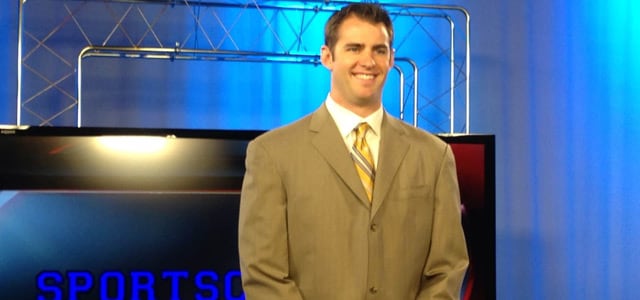
July 2, 2013
New Orleans Pelicans frontcourt reserve Jason Smith is often described by the team’s staff as a very “coachable” player. This is a good thing, because when the 7-footer was a recent participant at “Sportscaster U” at Syracuse University, the 27-year-old received the kind of intense instruction normally only seen on a basketball court.
Along with four other NBA players, Smith spent three June days at one of the nation’s premier broadcasting schools to learn more about a potential career. He received hands-on experience – as well as a few blunt assessments of his work while doing mock TV broadcasts of NBA playoff games.
“(The feedback) wasn’t like, ‘Oh yeah, you did really great!’ ” a smiling Smith described. “It was more like, ‘You need to do this, this and this. And you can’t do that!’ It challenged me. It definitely made me think, ‘Do I really want to pursue this as a career?’ ”
For most athletes, broadcasting is something to consider only when their playing days are coming to an end. To Smith’s credit, however, before he ever put on an NBA jersey, he was already thinking about his next move. Prior to his rookie season with the Philadelphia 76ers in the summer of 2007, Smith told the NBA Players Association that he was interested in broadcasting. This offseason, he was selected by the NBPA to participate in Syracuse’s annual program. The other active NBA players on hand were New Orleans teammate Roger Mason Jr. (now a free agent), Orlando’s Glen Davis and Dallas teammates Elton Brand and Mike James.
Smith’s 2012-13 NBA regular season was cut short by a shoulder injury, causing him to miss the final 24 games. One silver lining was that it allowed Smith to make periodic in-game appearances on New Orleans’ TV and radio broadcasts.
“It was fun,” Smith said of his cameos. “The people with the Pelicans were really easy to work with on air and kind of carried the whole thing. I felt comfortable during the season working with Jen Hale, Joel (Meyers) and David (Wesley), partly because we’re around them all the time (on road trips).”
By comparison, Smith found his Sportscaster U experience at Syracuse to be much more challenging, partly because he did mock broadcasts with partners he’d just met.
“At the time during the season I thought I did pretty well,” a grinning Smith assessed of his New Orleans TV work. “But after going through the program at Syracuse and learning some of the finer details, I went back and watched the tapes. I immediately started pointing out different things that I did wrong. I was like, ‘What are you doing? You shouldn’t do that! Why are you doing that?’ ”
One specific piece of advice Smith received at Syracuse was to not be overly negative. Though it seems difficult to picture given Smith’s upbeat personality, he found himself being constantly critical.
“You don’t want to be a player-killer (on the air),” Smith noted. “You kind of want to say some good things mixed in with some bad things. But I found myself saying bad thing after bad thing after bad thing. (The Syracuse instructors) were like, ‘You want to steer away from that, because you don’t want to be more of a Stephen A. (Smith). You want to be Jason Smith.’ ”
Smith said he appreciated Syracuse’s tough-love approach, believing it will make him a better broadcaster when he gets his next opportunity to go on the air. For now, however, Smith is entering the prime of his NBA career and expects to return to full health by the start of 2013-14 season. The five-year pro enjoyed his finest season during the lockout-shorted 2011-12 campaign, with career-high averages of 9.9 points and 4.9 rebounds.
“I could see myself (being a broadcaster someday), because it’s easy for me to talk to people about basketball,” Smith said. “I thought it was important for me to understand some of those little pointers about what to talk about, and how to convey your point to the public. It was a great learning experience. It was great to see the do’s and don’ts of TV and radio.
“People think, ‘Oh, I could be a TV announcer, no problem.’ But it’s a lot harder than it looks. A lot harder. They have a great program at Syracuse. It was a great experience overall, but it was much harder than I thought it would be.”